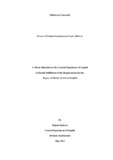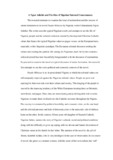Please use this identifier to cite or link to this item:
https://elibrary.tucl.edu.np/handle/123456789/782Full metadata record
| DC Field | Value | Language |
|---|---|---|
| dc.contributor.author | Sapkota, Rajesh | - |
| dc.date.accessioned | 2021-07-13T07:18:26Z | - |
| dc.date.available | 2021-07-13T07:18:26Z | - |
| dc.date.issued | 2011 | - |
| dc.identifier.uri | http://elibrary.tucl.edu.np/handle/123456789/782 | - |
| dc.description.abstract | In her debut novelPurple Hibiscus,Nigerian writer Chimamanda Ngozi Adichie strongly resists the values of the colonizers creating nationalistic narrative and the linguistic space using the colonial Catholic religion as the site of discursive struggle. Papa-Nnukwu, the so-called heathen father, disinherited by his Catholic son Eugene just for following the Nigerian cultural values, has been idealized by the narrator indicating his values far democratic than the Catholic values. Nigeria is on the state of politicalturmoil, ruled by military Junta and people are living suffocating life and the national and cultural values are invaded by the Catholic Church brandishing them as heathen. Fifteen years old narrator grows to the state of maturity and nationalistic awareness crossing the barriers of the rigid, imported Catholic values imposed by her father. She surpasses her father’s hatred to her grandfather and the Nigerian values amidst political tyranny in the country and patriarchal tyranny at home and grows to love them by heart. | en_US |
| dc.language.iso | en_US | en_US |
| dc.publisher | Department of English | en_US |
| dc.subject | colonial Catholic religion | en_US |
| dc.subject | Nationalism | en_US |
| dc.subject | Linguistic Community | en_US |
| dc.title | Process of Nation Formation in Purple Hibiscus | en_US |
| dc.type | Thesis | en_US |
| local.institute.title | Central Department of English | en_US |
| local.academic.level | Masters | en_US |
| Appears in Collections: | English | |
Files in This Item:
| File | Description | Size | Format | |
|---|---|---|---|---|
| Final Cover.pdf | 12.89 kB | Adobe PDF |  View/Open | |
| Chapters.pdf | 178.24 kB | Adobe PDF |  View/Open |
Items in DSpace are protected by copyright, with all rights reserved, unless otherwise indicated.
